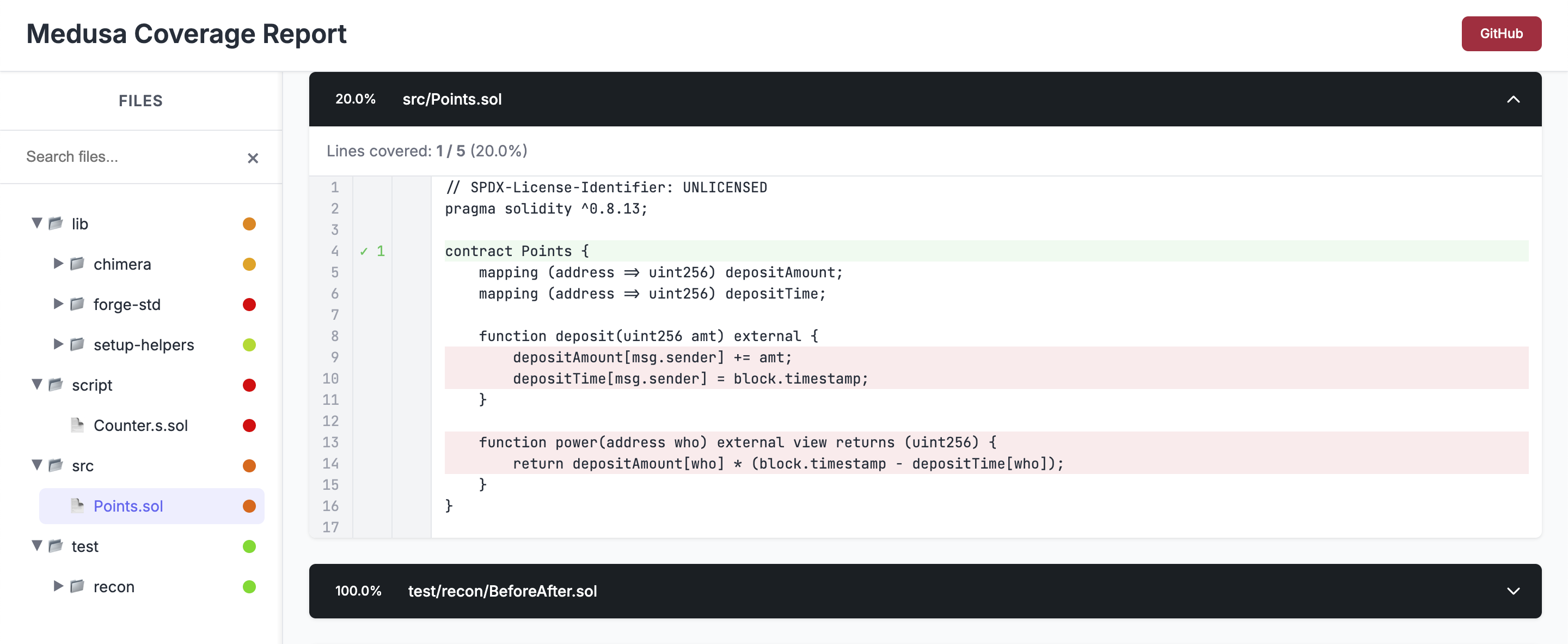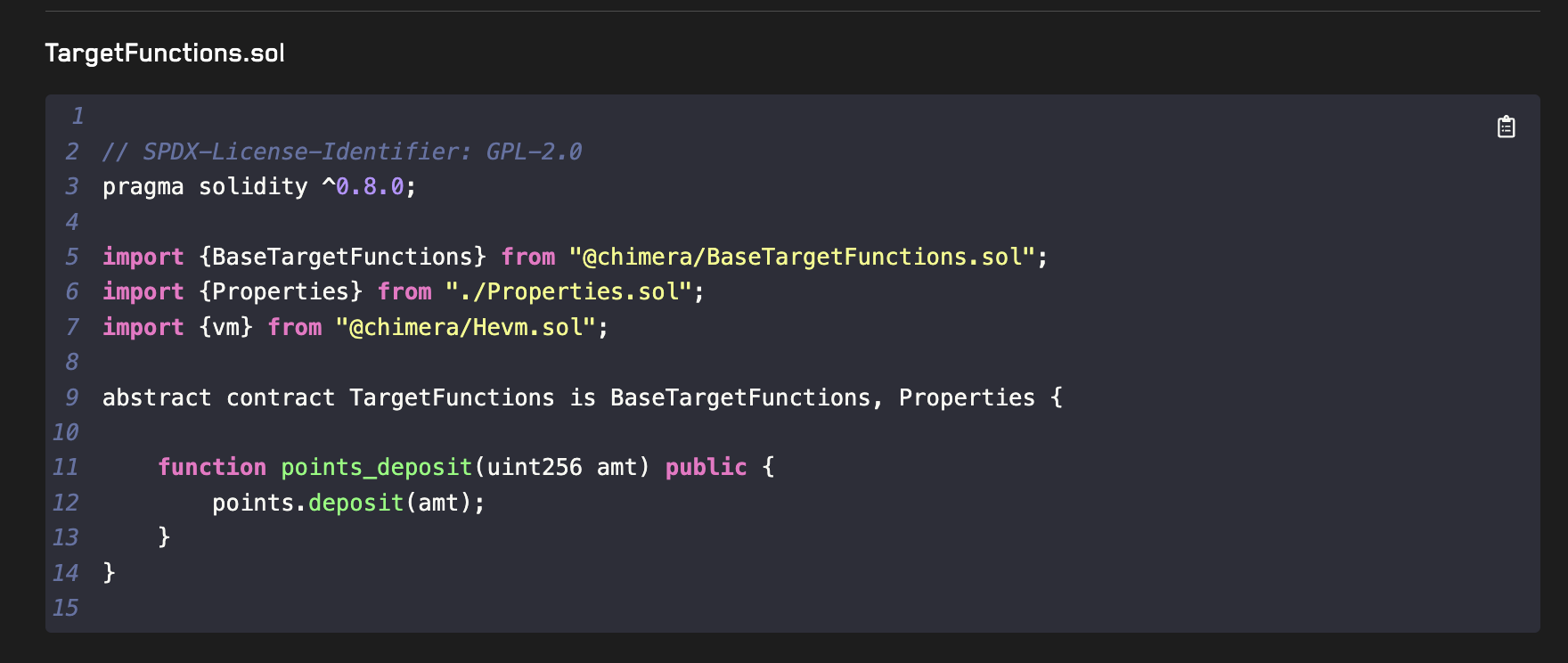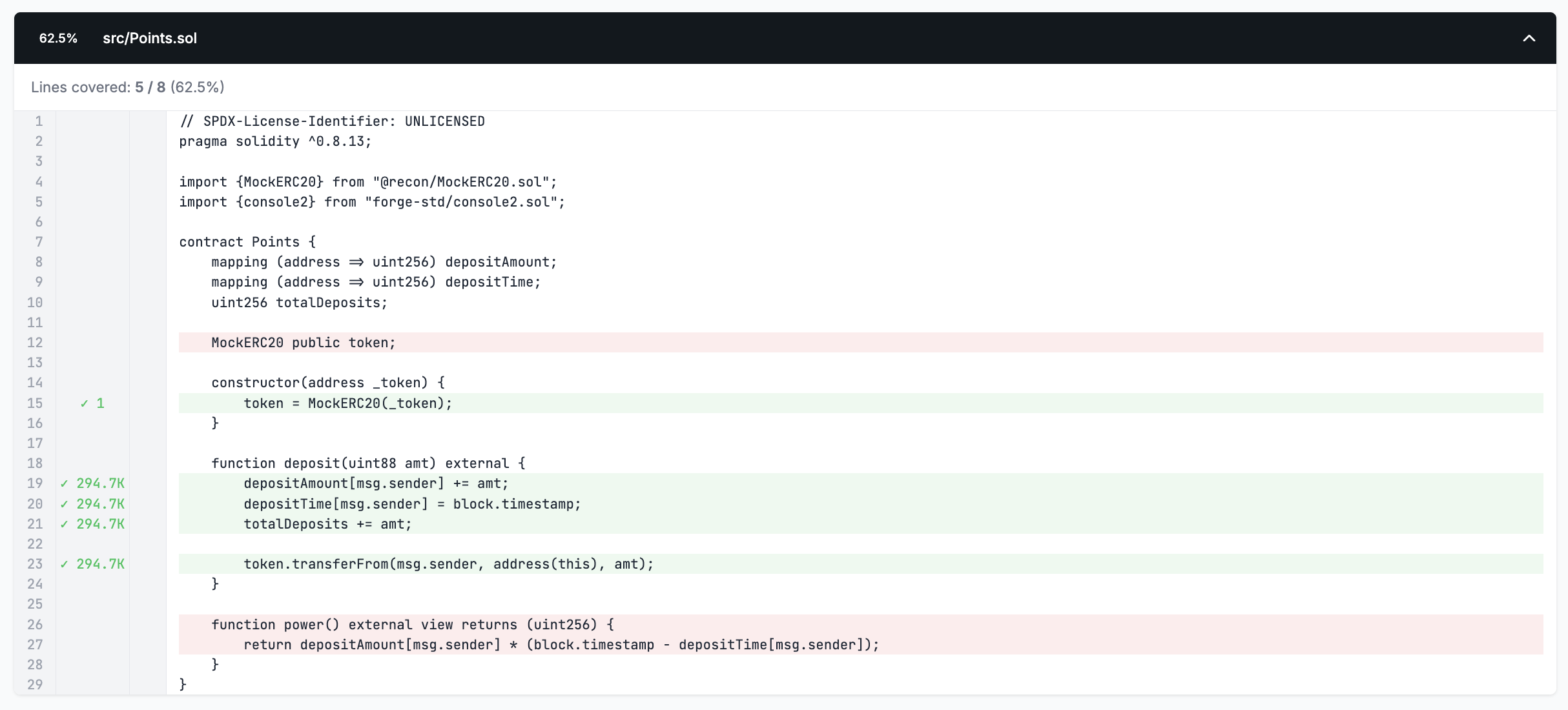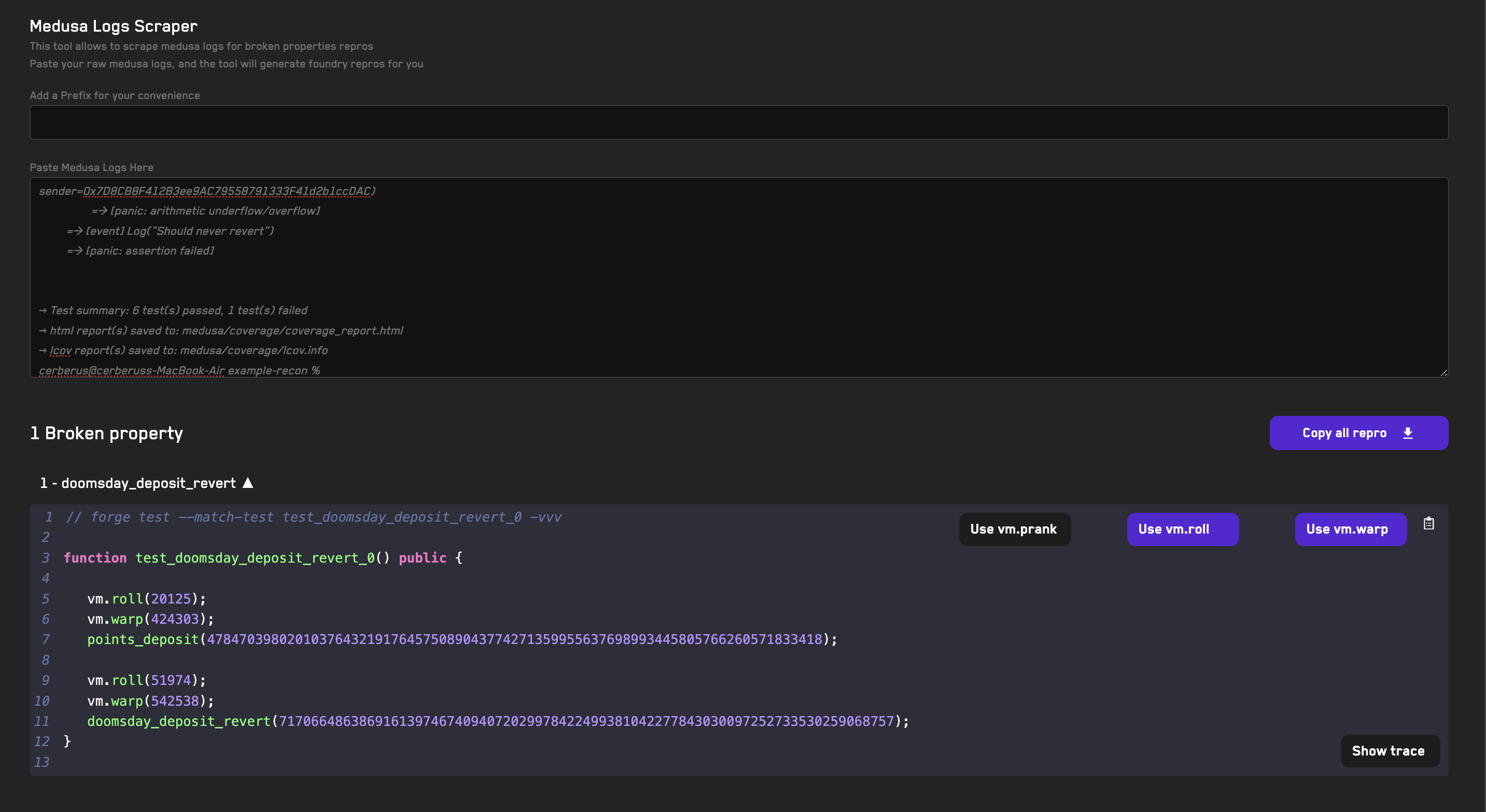Example Project
In this section, we'll use the Create Chimera App template to create a simple contract and run invariant tests on it.
Prerequisites: the example shown below requires that you have Foundry and Medusa installed on your local machine
Getting started
Clone the create-chimera-app-no-boilerplate repo.
Or
Use forge init --template https://github.com/Recon-Fuzz/create-chimera-app-no-boilerplate
Writing the contract
First, in the src/ directory we'll create a simple Points contract that allows users to make a deposit and earn points proportional to the amount of time that they've deposited for, where longer deposits equal more points:
// SPDX-License-Identifier: UNLICENSED
pragma solidity ^0.8.13;
import {MockERC20} from "@recon/MockERC20.sol";
contract Points {
mapping (address => uint88) depositAmount;
mapping (address => uint256) depositTime;
uint256 totalDeposits;
MockERC20 public token;
constructor(address _token) {
token = MockERC20(_token);
}
function deposit(uint88 amt) external {
depositAmount[msg.sender] += amt;
depositTime[msg.sender] = block.timestamp;
totalDeposits += amt;
token.transferFrom(msg.sender, address(this), amt);
}
function power() external view returns (uint256) {
return depositAmount[msg.sender] * (block.timestamp - depositTime[msg.sender]);
}
}
Adding to Setup
Now with a contract that we can test, we can deploy it in the Setup contract:
abstract contract Setup is BaseSetup, ActorManager, AssetManager, Utils {
Points points;
/// === Setup === ///
function setup() internal virtual override {
_newAsset(18); // deploys an 18 decimal token
// Deploy Points contract
points = new Points(_getAsset()); // uses the asset deployed above and managed by the AssetManager
// Mints the deployed asset to all actors and sets max allowances for the points contract
address[] memory approvalArray = new address[](1);
approvalArray[0] = address(points);
_finalizeAssetDeployment(_getActors(), approvalArray, type(uint256).max);
}
/// === MODIFIERS === ///
modifier asAdmin {
vm.prank(address(this));
_;
}
modifier asActor {
vm.prank(address(_getActor()));
_;
}
}
The AssetManager allows us to deploy assets (using _newAsset) that we can use in our Points contract with simplified fetching of the currently set asset using _getAsset().
We then use the _finalizeAssetDeployment utility function provided by the AssetManager to approve the deployed asset for all actors (tracked in the ActorManager) to the Points contract.
Running the fuzzer
We can now run the fuzzer with no state exploration since we haven't added handler functions.
Before we run the fuzzer however we'll use Foundry to check that the project compiles correctly because it provides faster feedback on this than Medusa.
Running forge build we see that it compiles successfully, meaning the deployment in the Setup contract works as expected:
$ forge build
[⠊] Compiling...
[⠘] Compiling 44 files with Solc 0.8.28
[⠃] Solc 0.8.28 finished in 717.19ms
Compiler run successful!
We can now run the Medusa fuzzer using medusa fuzz, which gives us the following output:
medusa fuzz
⇾ Reading the configuration file at: /temp/example-recon/medusa.json
⇾ Compiling targets with crytic-compile
⇾ Running command:
crytic-compile . --export-format solc --foundry-compile-all
⇾ Finished compiling targets in 5s
⇾ No Slither cached results found at slither_results.json
⇾ Running Slither:
slither . --ignore-compile --print echidna --json -
⇾ Finished running Slither in 7s
⇾ Initializing corpus
⇾ Setting up test chain
⇾ Finished setting up test chain
⇾ Fuzzing with 16 workers
⇾ [NOT STARTED] Assertion Test: CryticTester.switch_asset(uint256)
⇾ [NOT STARTED] Assertion Test: CryticTester.add_new_asset(uint8)
⇾ fuzz: elapsed: 0s, calls: 0 (0/sec), seq/s: 0, branches hit: 289, corpus: 0, failures: 0/0, gas/s: 0
⇾ [NOT STARTED] Assertion Test: CryticTester.asset_approve(address,uint128)
⇾ [NOT STARTED] Assertion Test: CryticTester.asset_mint(address,uint128)
⇾ [NOT STARTED] Assertion Test: CryticTester.switchActor(uint256)
⇾ fuzz: elapsed: 3s, calls: 70172 (23389/sec), seq/s: 230, branches hit: 481, corpus: 126, failures: 0/692, gas/s: 8560148887
⇾ fuzz: elapsed: 6s, calls: 141341 (236
You can now stop medusa with CTRL + C.
At this point, we expect almost no lines to be covered (indicated by the low corpus value in the console logs). We can note however that because the corpus value is nonzero, something is being covered, in our case this is the exposed functions in the ManagerTargets which provide handlers for the functions in the AssetManager and ActorManager.
We can now open the coverage report located at /medusa/coverage/coverage_report.html to confirm that none of the lines in the Points contract are actually being covered.
In our coverage report a line highlighted in green means the line was reached by the fuzzer, a line highlighted in red means the line was not.

Let's rectify the lack of coverage in our Points contract by adding target function handlers.
Building target functions
Foundry produces an /out folder any time you compile your project which contains the ABI of the Points contract.
We'll use this in conjunction with our Invariants builder to quickly generate target function handlers for our TargetFunctions contract using the following steps:
- Open
out/Points.sol/Points.json - Copy the entire contents
- Navigate to the Invariants Builder
- Paste the ABI
- Rename the contract to
pointsreplacing the text in the "Your_contract" form field
This generates a TargetFunctions contract for Points. In our case we'll first just add the handler created for the deposit function:

In this case you can just copy the points_deposit handler into your TargetFunctions.sol contract. When working on a larger project however, you can use the Download All Files button to add multiple handlers directly into your project at once.
Make sure to add the updateGhosts and asActor modifiers to the points_deposit function if they are not present:
updateGhosts- will update all ghost variables before and after the call to the functionasActor- will ensure that the call is made by the currently active actor (returned by_getActor())
Your TargetFunctions contract should now look like:
abstract contract TargetFunctions is
AdminTargets,
DoomsdayTargets,
ManagersTargets
{
function points_deposit(uint88 amt) public updateGhosts asActor {
points.deposit(amt);
}
}
We can now run Medusa again to see how our newly added target function has changed our coverage.

We now see that the deposit function is fully covered, but the power function is not since we haven't added a handler for it. Since the power function is non-state-changing (indicated by the view decorator) we'll leave it without a handler for now as it won't affect our ability to test properties.
The coverage report is effectively our eyes into what the fuzzer is doing.
We can now start defining properties to see if there are any edge cases in our Points contract that we may not have expected.
Implementing Properties
Checking for overflow
A standard property we might want to check in our Points contract is that it doesn't revert due to overflow.
Reverts due to over/underflow are not detected by default in Medusa and Echidna, so to explicitly test for this we can use a try-catch block in our DoomsdayTargets contract (this contract is meant for us to define things that should never happen in the system):
...
import {Panic} from "@recon/Panic.sol";
abstract contract DoomsdayTargets is
BaseTargetFunctions,
Properties
{
/// Makes a handler have no side effects
/// The fuzzer will call this and because it reverts it will be removed from call sequences during shrinking
modifier stateless() {
_;
revert("stateless");
}
function doomsday_deposit_revert(uint88 amt) public stateless asActor {
try points.deposit(amt) {
// success
} catch (bytes memory err) {
expectedError = checkError(err, Panic.arithmeticPanic); // catches the specific revert we're interested in
t(!expectedError, "should never revert due to under/overflow");
}
}
}
We use the
checkErrorfunction from the Utils contract to allow us to check for a particular revert message. ThePaniclibrary allows us to easily check for an arithmetic panic in particular without having to specify the panic code (note that this needs to be added as an import in the above).
We use the stateless modifier so that state changes made by this function call aren't preserved because they make the same changes as the points_deposit function.
Having two handlers that make the same state changes makes it more difficult to debug when we have a broken call sequence because we can easily tell what the points_deposit function does but it's not as clear from the name what the doomsday_deposit_revert does. Having doomsday_deposit_revert be stateless ensures that it only gets executed as a test in a call sequence for specific behavior that should never happen.
This pattern is very useful if you want to perform extremely specific tests that would make your normal handlers unnecessarily complex.
Testing for monotonicity
We can say that the Points contract's power variable value should be monotonically increasing (always increasing) since there's no way to withdraw, which we can prove with a global property and ghost variables.
To keep things simple, we'll only test this property on the current actor (handled by the ActorManager) which we can fetch using _getActor().
Next we'll need a way to fetch the power for the deposited user before and after each call to our points_deposit target function using the BeforeAfter contract:
abstract contract BeforeAfter is Setup {
struct Vars {
uint256 power;
}
Vars internal _before;
Vars internal _after;
modifier updateGhosts {
__before();
_;
__after();
}
function __before() internal {
// reads value from state before the target function call
_before.power = points.power();
}
function __after() internal {
// reads value from state after the target function call
_after.power = points.power();
}
}
This will update the power value in the _before and _after struct when the updateGhosts modifier is called on the points_deposit handler.
Now that we can know the state of the system before our state changing call, we can specify the property in the Properties contract:
abstract contract Properties is BeforeAfter, Asserts {
function property_powerIsMonotonic() public {
gte(_after.power, _before.power, "property_powerIsMonotonic");
}
}
If we now run medusa fuzz we should get two broken properties!
Broken properties
Generating reproducers
After running the fuzzer you should see the following broken property in the console logs:
⇾ [FAILED] Assertion Test: CryticTester.doomsday_deposit_revert(uint88)
Test for method "CryticTester.doomsday_deposit_revert(uint88)" resulted in an assertion failure after the following call sequence:
[Call Sequence]
1) CryticTester.points_deposit(uint88)(235309800868430114045226835) (block=2, time=573348, gas=12500000, gasprice=1, value=0, sender=0x10000)
2) CryticTester.doomsday_deposit_revert(uint88)(102431335005787171573853953) (block=2, time=573348, gas=12500000, gasprice=1, value=0, sender=0x30000)
[Execution Trace]
=> [call] CryticTester.doomsday_deposit_revert(uint88)(102431335005787171573853953) (addr=0x7D8CB8F412B3ee9AC79558791333F41d2b1ccDAC, value=0, sender=0x30000)
=> [call] StdCheats.prank(address)(0x7D8CB8F412B3ee9AC79558791333F41d2b1ccDAC) (addr=0x7109709ECfa91a80626fF3989D68f67F5b1DD12D, value=0, sender=0x7D8CB8F412B3ee9AC79558791333F41d2b1ccDAC)
=> [return ()]
=> [call] Points.deposit(uint88)(102431335005787171573853953) (addr=0x6804A3FF6bcf551fACf1a66369a5f8802B3C9C58, value=0, sender=0x7D8CB8F412B3ee9AC79558791333F41d2b1ccDAC)
=> [panic: arithmetic underflow/overflow]
=> [event] Log("should never revert due to under/overflow")
=> [panic: assertion failed]
For all but the simplest call sequences this is very difficult to read and even harder to debug. This is why we made the Chimera Framework extremely opinionated, because we believe that reading Medusa and Echdina traces is a very slow and difficult way to debug broken properties.
As a result of this, all of our templates come with the ability to reproduce broken properties as unit tests in Foundry.
So instead of debugging our broken property from the Medusa logs directly, we'll use Foundry:
- Copy the Medusa output logs in your terminal
- Go to the Medusa Log Scraper tool
- Paste the logs
- A reproducer unit test will be created for the broken property automatically
- Click the dropdown arrow to show the unit test

- Disable the
vm.prankcheatcode by clicking the button (as we're overriding Medusa's behavior) - Click on the clipboard icon to copy the reproducer
- Open the
CryticToFoundrycontract and paste the reproducer unit test - Run it with Foundry using the
forge test --match-test test_doomsday_deposit_revert_0 -vvvcommand in the comment above it
// forge test --match-contract CryticToFoundry -vv
contract CryticToFoundry is Test, TargetFunctions, FoundryAsserts {
function setUp() public {
setup();
}
// forge test --match-test test_doomsday_deposit_revert_0 -vvv
function test_doomsday_deposit_revert_0() public {
vm.roll(2);
vm.warp(573348);
points_deposit(235309800868430114045226835);
vm.roll(2);
vm.warp(573348);
doomsday_deposit_revert(102431335005787171573853953);
}
}
We now have a Foundry reproducer! This makes it much easier to debug because we can quickly test only the call sequence that causes the property to break and add logging statements wherever needed.
You'll also notice that although intuitively the property_powerIsMonotonic property should not break because we don't allow deposits to be withdrawn, the fuzzer breaks it:
⇾ [FAILED] Assertion Test: CryticTester.property_powerIsMonotonic()
Test for method "CryticTester.property_powerIsMonotonic()" resulted in an assertion failure after the following call sequence:
[Call Sequence]
1) CryticTester.points_deposit(uint88)(38781313) (block=9757, time=110476, gas=12500000, gasprice=1, value=0, sender=0x10000)
2) CryticTester.points_deposit(uint88)(0) (block=44980, time=367503, gas=12500000, gasprice=1, value=0, sender=0x20000)
3) CryticTester.property_powerIsMonotonic()() (block=44981, time=422507, gas=12500000, gasprice=1, value=0, sender=0x10000)
[Execution Trace]
=> [call] CryticTester.property_powerIsMonotonic()() (addr=0x7D8CB8F412B3ee9AC79558791333F41d2b1ccDAC, value=0, sender=0x10000)
=> [event] Log("property_powerIsMonotonic")
=> [panic: assertion failed]
Debugging the cause of this break is left as an exercise for the reader, but we'll learn some useful tricks in the next section below for debugging the broken property in points_deposit.
Debugging the overflow property
Running the reproducer for the doomsday_deposit_revert property we can clearly see that we get an over/underflow but it's not very clear from the call trace where this happens exactly:
├─ [843] Points::deposit(102431335005787171573853953 [1.024e26])
│ └─ ← [Revert] panic: arithmetic underflow or overflow (0x11)
├─ [7048] Utils::checkError(0x4e487b710000000000000000000000000000000000000000000000000000000000000011, "Panic(17)")
│ ├─ [6142] Utils::_getRevertMsg(0x4e487b710000000000000000000000000000000000000000000000000000000000000011)
│ │ ├─ [930] Utils::_checkIfPanic(0x4e487b710000000000000000000000000000000000000000000000000000000000000011)
│ │ │ └─ ← true
│ │ ├─ [5062] Utils::_getPanicCode(0x4e487b710000000000000000000000000000000000000000000000000000000000000011)
│ │ │ └─ ← "Panic(17)", false
│ │ └─ ← "Panic(17)", false
│ └─ ← true
├─ [0] VM::assertTrue(false, "should never revert due to under/overflow") [staticcall]
│ └─ ← [Revert] should never revert due to under/overflow
└─ ← [Revert] should never revert due to under/overflow
We can add console logs to the Points contract and the reproducer to see where exactly it overflows:
function deposit(uint88 amt) external {
console2.log("here 1");
depositAmount[msg.sender] += amt;
console2.log("here 2");
depositTime[msg.sender] = block.timestamp;
console2.log("here 3");
totalDeposits += amt;
console2.log("here 4");
token.transferFrom(msg.sender, address(this), amt);
}
function test_doomsday_deposit_revert_0() public {
console2.log("=== Before Deposit ===");
vm.roll(2);
vm.warp(573348);
points_deposit(235309800868430114045226835);
console2.log("=== Before Doomsday ===");
vm.roll(2);
vm.warp(573348);
doomsday_deposit_revert(102431335005787171573853953);
}
Which gives us the following console logs when we run the test:
=== Before Deposit ===
here 1
here 2
here 3
here 4
=== Before Doomsday ===
here 1
This indicates to us that the issue is in the second increment of depositAmount. If we check the type of depositAmount we see that it's a uint88.
contract Points {
mapping (address => uint88) depositAmount;
...
}
This indicates that we must be depositing more than type(uint88).max, and if we check if the sum of the deposited amounts in the test is greater than type(uint88).max, we get the following:
sum of deposits 337741135874217285619080788
type(uint88).max 309485009821345068724781055
sum of deposits > type(uint88).max true
So we can see that the issue happens because in our Setup we initially mint type(uint256).max to the actor so they can deposit more than type(uint88).max over multiple calls:
function setup() internal virtual override {
...
_finalizeAssetDeployment(_getActors(), approvalArray, type(uint256).max);
}
This means that to fix the broken property we either need to change the type of the depositAmount variable to uint256 or limit the amount that we initially mint to the actor. For our purposes we'll change the type of the depositAmount variable.
Now when we run the fuzzer we can see that the property no longer breaks:
^C⇾ Fuzzer stopped, test results follow below ...
⇾ [PASSED] Assertion Test: CryticTester.add_new_asset(uint8)
⇾ [PASSED] Assertion Test: CryticTester.asset_approve(address,uint128)
⇾ [PASSED] Assertion Test: CryticTester.asset_mint(address,uint128)
⇾ [PASSED] Assertion Test: CryticTester.doomsday_deposit_revert(uint88)
⇾ [PASSED] Assertion Test: CryticTester.points_deposit(uint88)
⇾ [PASSED] Assertion Test: CryticTester.switch_asset(uint256)
⇾ [PASSED] Assertion Test: CryticTester.switchActor(uint256)
⇾ [FAILED] Assertion Test: CryticTester.property_powerIsMonotonic()
Test for method "CryticTester.property_powerIsMonotonic()" resulted in an assertion failure after the following call sequence:
[Call Sequence]
1) CryticTester.points_deposit(uint88)(73786976294838206465) (block=19477, time=38924, gas=12500000, gasprice=1, value=0, sender=0x30000)
2) CryticTester.asset_mint(address,uint128)(0x7D8CB8F412B3ee9AC79558791333F41d2b1ccDAC, 79387721835223434743036999817) (block=43362, time=399548, gas=12500000, gasprice=1, value=0, sender=0x10000)
3) CryticTester.points_deposit(uint88)(0) (block=43362, time=399548, gas=12500000, gasprice=1, value=0, sender=0x10000)
4) CryticTester.property_powerIsMonotonic()() (block=43363, time=882260, gas=12500000, gasprice=1, value=0, sender=0x30000)
[Execution Trace]
=> [call] CryticTester.property_powerIsMonotonic()() (addr=0x7D8CB8F412B3ee9AC79558791333F41d2b1ccDAC, value=0, sender=0x30000)
=> [event] Log("property_powerIsMonotonic")
=> [panic: assertion failed]
⇾ Test summary: 7 test(s) passed, 1 test(s) failed
This is one of the key benefits of having properties defined, they allow you to check your codebase against any changes you make to ensure that you don't introduce new bugs.
Note that changing the
depositAmounttouint256only resolves this issue when we have a single actor that deposits, if there are multiple actors that deposit whose balances sum to more thantype(uint256).maxthe property will break again.
Now it's your turn, see if you can apply the techniques discussed here to figure out why the property_powerIsMonotonic breaks!
If you get stuck or need help, reach out to the Recon team in our discord!